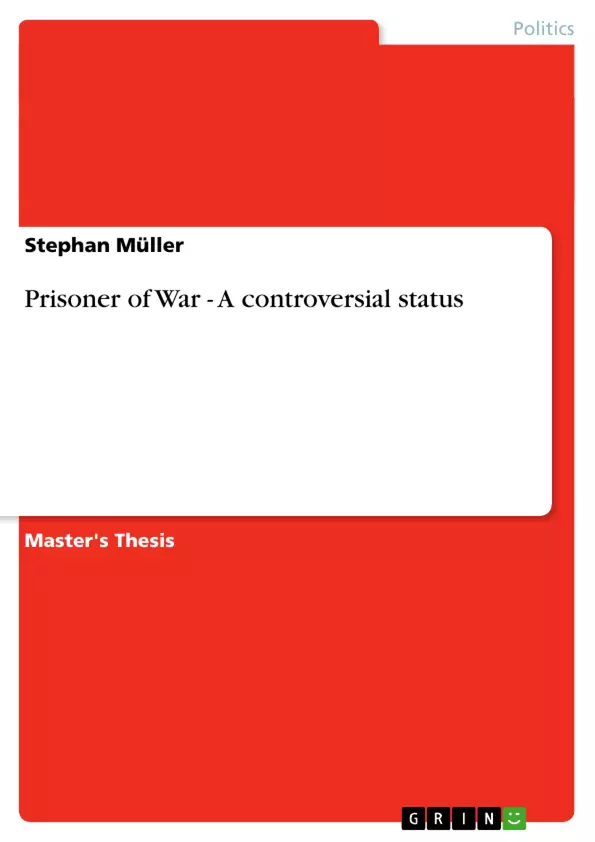
Prisoner of War - A controversial status
Masterarbeit, 2009
37 Seiten, Note: 2,4
Leseprobe
Inhaltsverzeichnis (Table of Contents)
- A) Summary
- B) Introduction
- I. Humanitarian Right
- II. Armed Conflict
- III. Protected groups
- 1. The Taliban soldiers
- 2. The members of Al-Qaeda captured within the Afghanistan Conflict
- 3. The Al-Qaeda members captured within the "War on Terror" beyond the Afghanistan Conflict
- IV. Status determination in doubtful circumstances
- 1. Cases of doubt
- 2. Competent tribunal
- V. The State Practise of the USA
- VI. Due process rights
- 1. Right to employ a lawyer
- 2. The writ of habeas corpus
- VII. Criminal responsibility
- C) Conclusion
Zielsetzung und Themenschwerpunkte (Objectives and Key Themes)
This research paper examines the legal status of prisoners of war (POWs), specifically focusing on US state practice regarding detainees captured during the Afghanistan War and the "War on Terror." The paper analyzes the justifiable classification of prisoners, including the controversial designation of "unlawful combatants," and explores the relationship between humanitarian law, human rights, and domestic law within the context of US court decisions. The implications of criminal liability under both domestic and international law are also considered.
- The definition and application of Prisoner of War (POW) status under the Geneva Conventions.
- The legal implications of classifying detainees as "unlawful combatants."
- The interplay between humanitarian law, human rights law, and US domestic law in the treatment of detainees.
- Due process rights afforded to detainees, including access to legal counsel and habeas corpus.
- The criminal responsibility of detainees under international and domestic legal frameworks.
Zusammenfassung der Kapitel (Chapter Summaries)
A) Summary: Provides a brief overview of the paper's key findings and arguments.
B) Introduction: Sets the context by discussing the Authorization for Use of Military Force against Terrorists and the detention of prisoners at Guantanamo Bay. It highlights the controversies surrounding the legal status of these prisoners and the denial of POW status.
I. Humanitarian Right: Traces the historical evolution of POW rights, culminating in the Geneva Conventions and their emphasis on humane treatment.
II. Armed Conflict: Discusses the criteria for determining the existence of an international armed conflict and concludes that such a conflict exists based on US military actions in Afghanistan.
III. Protected groups: Analyzes the criteria for POW status under the Geneva Conventions and examines whether Taliban soldiers and Al-Qaeda members meet these criteria. The complexities of applying these criteria to the diverse groups involved in the conflict are explored.
IV. Status determination in doubtful circumstances: Explores the procedures for determining POW status in ambiguous cases and examines the role of competent tribunals.
V. The State Practise of the USA: Critically assesses US state practice regarding the treatment of detainees, focusing on the Combatant Status Review Tribunal (CSRT) and its processes. It discusses the legal challenges to US detention practices and relevant Supreme Court rulings.
VI. Due process rights: Examines the denial of legal counsel and access to habeas corpus, contrasting this with internationally recognized due process rights. Relevant case law is discussed.
VII. Criminal responsibility: Investigates the jurisdictional aspects of prosecuting detainees for war crimes or terrorist acts. This section examines the legal basis and implications of using military commissions and compares that to internationally accepted standards of criminal justice.
Schlüsselwörter (Keywords)
Prisoner of War, Geneva Conventions, unlawful combatants, War on Terror, Guantanamo Bay, humanitarian law, human rights, due process, habeas corpus, military tribunals, criminal responsibility, Combatant Status Review Tribunal (CSRT), Hamdan v. Rumsfeld, Boumediene v. Bush, Rasul v. Bush.
Details
- Titel
- Prisoner of War - A controversial status
- Hochschule
- Universität Stellenbosch
- Note
- 2,4
- Autor
- Stephan Müller (Autor:in)
- Erscheinungsjahr
- 2009
- Seiten
- 37
- Katalognummer
- V123573
- ISBN (eBook)
- 9783640281459
- ISBN (Buch)
- 9783640284344
- Dateigröße
- 588 KB
- Sprache
- Englisch
- Schlagworte
- Prisoner
- Produktsicherheit
- GRIN Publishing GmbH
- Preis (Ebook)
- US$ 16,99
- Preis (Book)
- US$ 18,99
- Arbeit zitieren
- Stephan Müller (Autor:in), 2009, Prisoner of War - A controversial status, München, Page::Imprint:: GRINVerlagOHG, https://www.diplomarbeiten24.de/document/123573
- Autor werden
- Ihre Optionen
- Vertriebskanäle
- Premium Services
- Autorenprofil
- Textarten und Formate
- Services für Verlage, Hochschulen, Unternehmen

- © GRIN Publishing GmbH.
- Alle Inhalte urheberrechtlich geschützt. Kopieren und verbreiten untersagt.
- info@grin.com
- AGB
- Open Publishing
Der GRIN Verlag hat sich seit 1998 auf die Veröffentlichung akademischer eBooks und Bücher spezialisiert. Der GRIN Verlag steht damit als erstes Unternehmen für User Generated Quality Content. Die Verlagsseiten GRIN.com, Hausarbeiten.de und Diplomarbeiten24 bieten für Hochschullehrer, Absolventen und Studenten die ideale Plattform, wissenschaftliche Texte wie Hausarbeiten, Referate, Bachelorarbeiten, Masterarbeiten, Diplomarbeiten, Dissertationen und wissenschaftliche Aufsätze einem breiten Publikum zu präsentieren.
Kostenfreie Veröffentlichung: Hausarbeit, Bachelorarbeit, Diplomarbeit, Dissertation, Masterarbeit, Interpretation oder Referat jetzt veröffentlichen!
- GRIN Verlag GmbH
-
- Nymphenburger Str. 86
- 80636
- Munich, Deutschland
- +49 89-550559-0
- +49 89-550559-10
- info@grin.com
-









